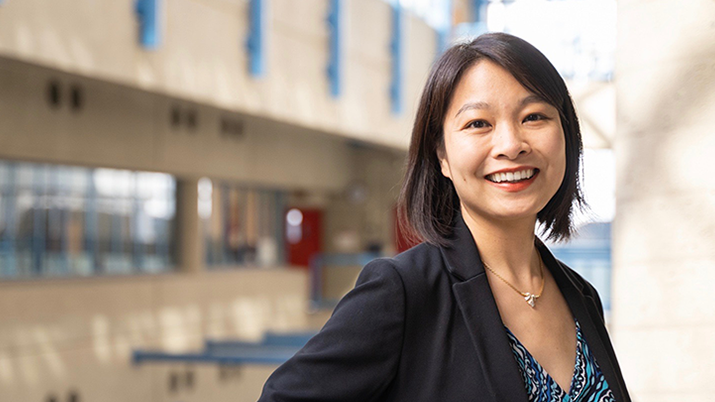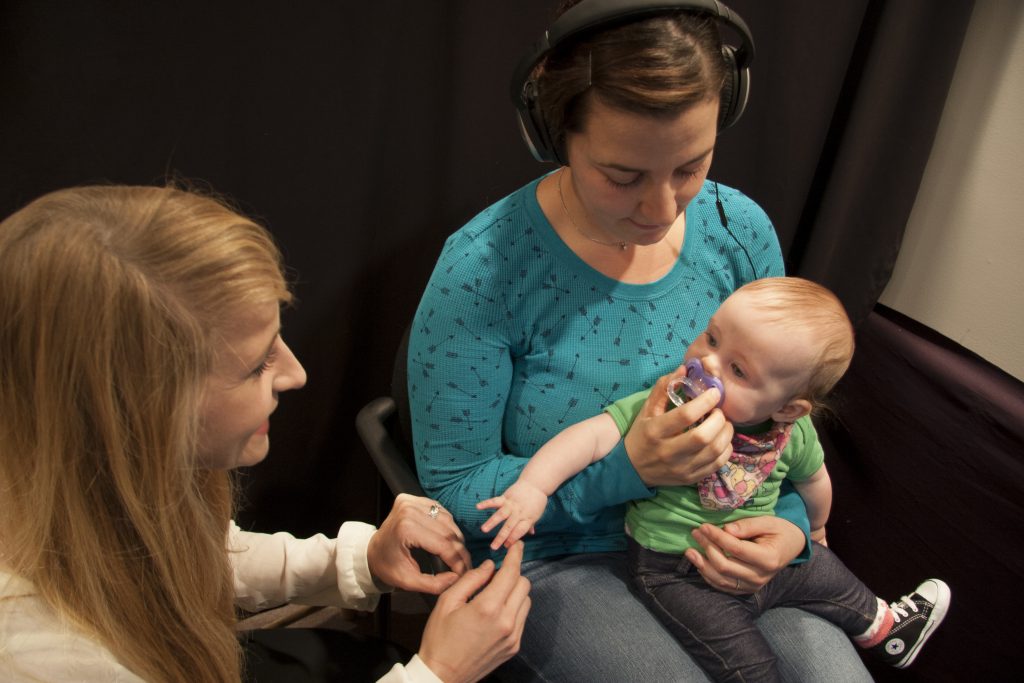

A child participant in the Infant Studies Centre
It’s not unusual to hear the sounds of children’s voices or laughter echoing in the halls of the Kenny building; kids visit daily to take part in a number of developmental studies in our research labs.
When looking at UBC Psychology’s Douglas T. Kenny building, a rigid concrete structure where many devoted students and distinguished professors conduct innovative research, one would never guess that the first floor has a series of brightly coloured playrooms full of games and toys for children. In fact, for some children, the Kenny building is the host of many positive feelings of fun and social interaction in the form of research.
Since 2004, the Early Development Research Group (EDRG) has been advancing knowledge of how language, learning, and social understanding develop in infants and children. The EDRG is composed of six research centres in the Department of Psychology including the Centre for Infant Cognition; the Centre for Cognitive Development; the Infant Studies Centre; the K.I.D. Studies Centre, the Language Development Centre; and the Social Cognitive Development Lab. We learn more about the EDRG, the research taking place, and how this unique collaboration is making science fun for kids.
The birth of the EDRG
The first years of a child’s life are fundamentally important and the scientists in the EDRG are dedicated to researching the different stages of child development. From exploring language acquisition in children–to investigating the emotional response of sharing in toddlers–to understanding the critical periods of learning, there are a variety of studies available for children of all ages.
Early on in the course of her 30-year career in developmental psychology, Dr. Janet Werker, Director of the Infant Studies Centre, identified a need to build a database of the families who were participating in her research. Her database started small with babies as young as a day or two old who were born in the maternity ward at BC Women’s Hospital. The babies were recruited to participate in the studies taking place in Werker’s on-site newborn lab.
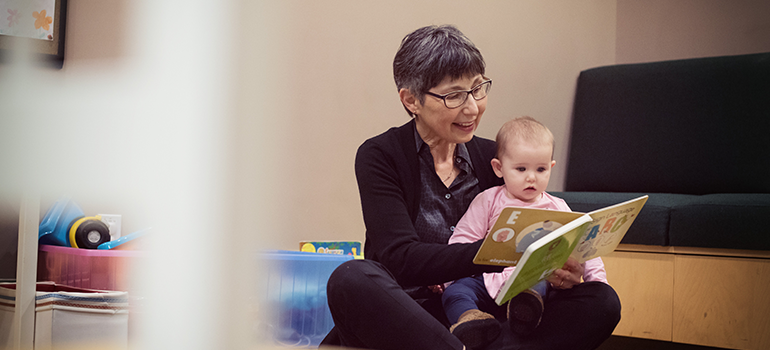

Dr. Janet Werker in the Infant Studies Centre
Along with the database, the EDRG was formed. And as the number of developmental labs in the department grew, so did the database. Now the database has over 36,000 families; many of the babies who participated in a newborn study are still in the database along with their siblings. Parents find that participating in the studies is a rewarding family experience and they have opted to remain in the database.
The members of the EDRG collaborate in multiple ways, sharing not only the database but resources, research assistants, training, and even parking spaces. “Once you start collaborating on infrastructure, you start collaborating on ideas,” Werker says. “We’re seeing more and more collaborations between the Early Development faculty members, and many of the students and postdoctoral fellows working across the labs.”
One big happy family
The EDRG plays an important role in coordinating families for the various studies being conducted by its members. Families often visit one lab to take part in a study and the EDRG will find a different study for another child in the family to take part in at the same time. This makes the experience fun and engaging for the whole family.
Robbie Ruddell, the EDRG Recruitment Coordinator, says cross family coordination is key to the EDRG. “We do our very best to make each visit easy and enjoyable,” says Ruddell. “The EDRG creates a seamless experience for families visiting our research labs and we want all members of the family to feel involved.”


Dr. Susan Birch
Dr. Susan Birch, an Associate Professor in Developmental Psychology at UBC, is Director of the K.I.D. Studies Centre; one of the research centres in the EDRG. The centre studies Knowledge, Imagination, and Development (i.e. K.I.D.) with a particular focus on children’s and adults’ ability to reason about someone else’s perspective.
“We often have double bookings, where a family comes in with their three-year-old child and their three-month-old baby,” says Birch. “We do a lot of coordinating across the labs. The three-year-old can participate in our study and their baby brother or sister can take part in a study in an infant lab.”
Creating memories through research
Dr. Birch recalls a time when a child vividly remembered the features of a room he had done a study in three years previously. “When one parent said her six-year-old son was coming in again, and the last time he had been in was when he was three, her son asked her excitedly whether they were going to the room with the blue couch and the white robot.” Birch hopes that the experience “instills in them a curiosity to know more about research.”
When lead into the K.I.D. Studies Centre’s comfortable, cheerfully decorated waiting room, it’s easy to envision what the experience would be like for a family.
“All of our studies are presented as games, and the kids seem to like having the one-on-one attention and the chance to show off their talents.” For children who are more nervous, Dr. Birch and her researchers make sure to establish a warm and welcoming environment that allows them to open up. “We always praise any and all of their responses that they give. They’ve never given negative feedback, and their responses are very positive. I think they feel really proud and enjoy it.”
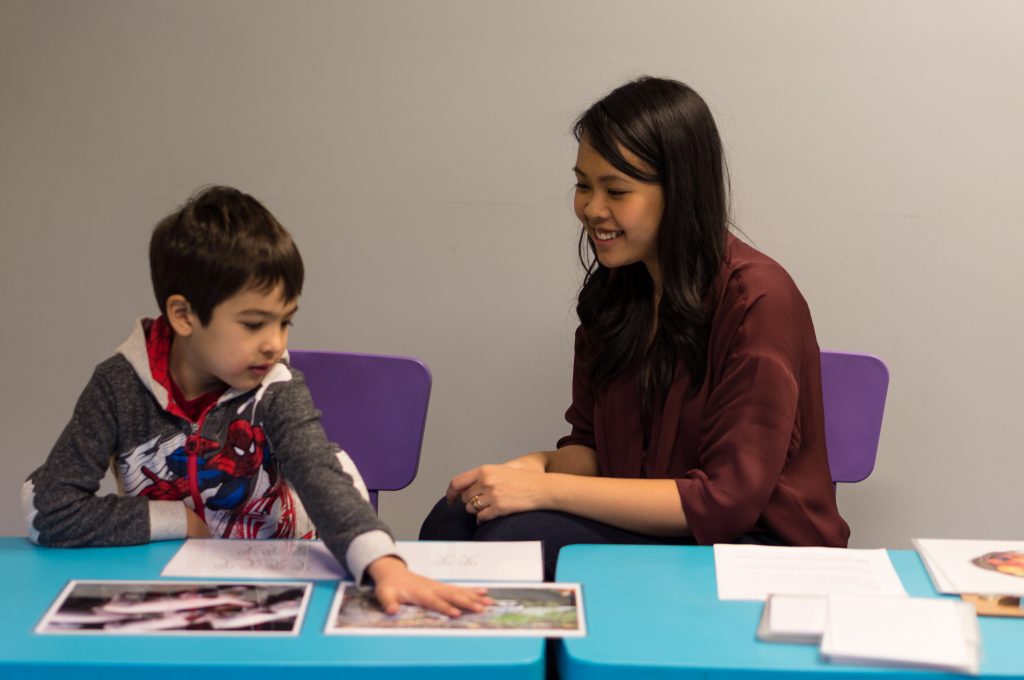

A child taking part in a K.I.D. Studies Centre experiment
Dr. Birch’s current research looks at social perspective taking, which is defined by how people reason about mental states and make inferences about the mental states of others (e.g., others’ knowledge intentions, and beliefs). In order to establish the developmental progression, studies involving children are essential to mark out the milestones in their growing perception of external cues that allow them to infer the contents of others’ minds. A specific cue that Dr. Birch is focusing on is how children relate confidence and competence. “We have found that children aged from two upwards generally prefer to learn from individuals that are more confident.”
One of her studies has children observe a video of two models that demonstrate different levels of confidence in interacting with an unknown object. Children have a strong tendency to identify the correct model as the one who is more confident in her actions. However, as Dr. Birch notes, “Confidence isn’t always a useful cue. We [also] wanted to know how sophisticated are children’s understanding of confidence. Can they discriminate between valid confidence and unjustifiable confidence? And if so, at what age can they recognize when confidence is well-founded?” In order to address these questions further, Dr. Birch’s current study has children observe two models that show equal confidence, but with one being clearly wrong. Children are then asked who they would like to learn new information from. Based on their responses, she will be able to determine how they think about the relationships between confidence, accuracy, and knowledge.
Making science fun
A unique and fun way that the EDRG keeps a record of returning families is by awarding the children with commemorative certificates that have increasing levels of achievement. They may start with a BA and progress to Canada Research Chair. Eventually the child receives a Minister of Advanced Education designation.
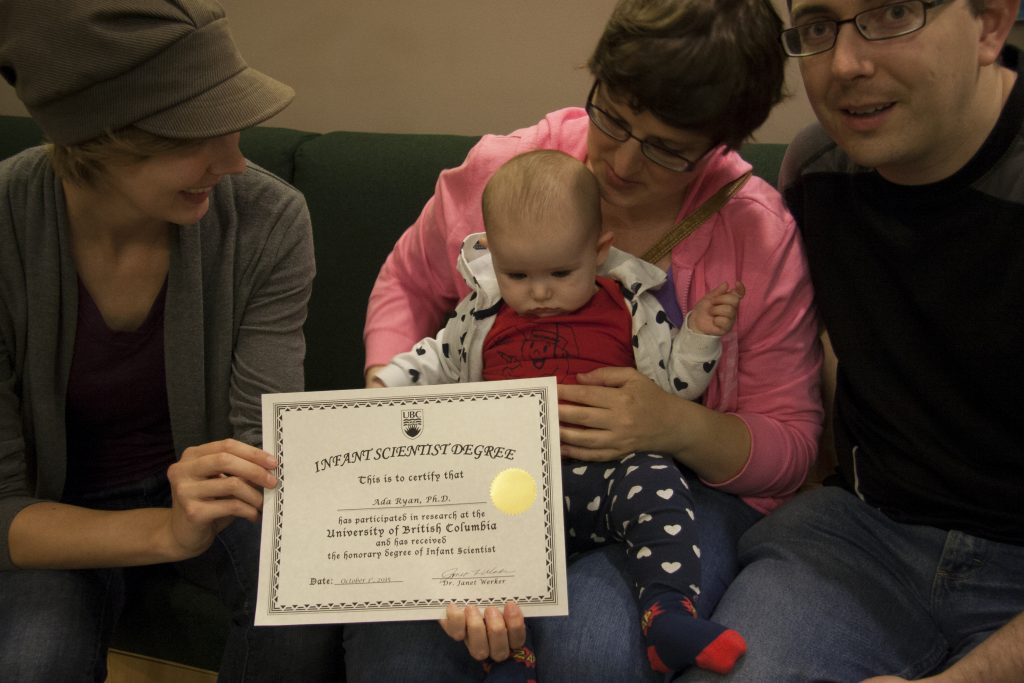

Savannah Nijeboer (left) presenting an Infant Scientist Degree
“We have studies for all ages up to and including teenagers,” says Savannah Nijeboer, Research Coordinator with the Infant Studies Centre. “We have children who have been participating with us for many years and have now achieved our highest degree!”
As a result, she adds “we’ve had to create more degree designations for these super scientists, including Member of the Order of British Columbia.”
The honorary UBC certificates add a sense of ceremony to the process and children are also presented with a gift, such as an infant scientist t-shirt, a bib, bath toy, plush animal, or a book.
Participating in research makes science fun for kids and parents, while improving our understanding of early child development. It exposes kids to science and it may even inspire a new generation of scientists.
The Early Development Research Group is always looking for families interested in participating as well as learning about their research. A typical study involves a one-time visit of approximately 30 minutes and free parking is provided. By signing up you will be considered for all studies offered by the Early Development Research Group and its six research centres. To learn more and to sign up visit edrg.psych.ubc.ca.
– Samantha Yang with Bonnie Vockeroth
Related
Dr. Janet Werker honored for research in children’s language acquistion
Dr. Kiley Hamlin receives Rising Star award
Dr. Andrew Baron’s path to research


